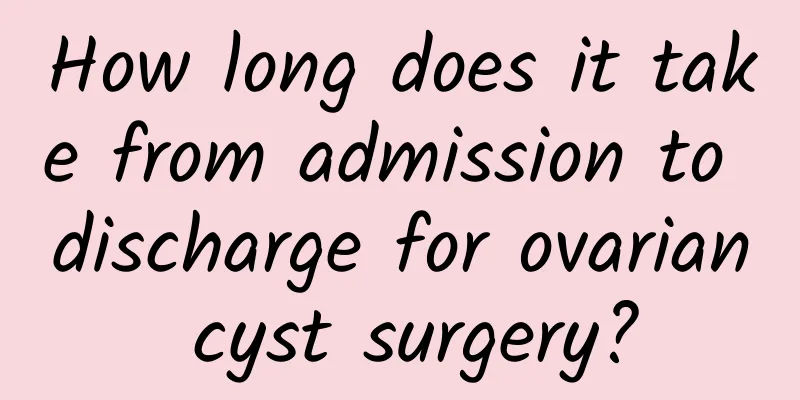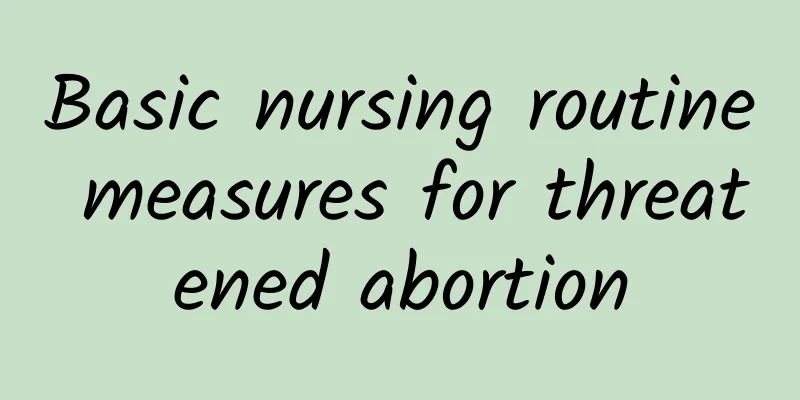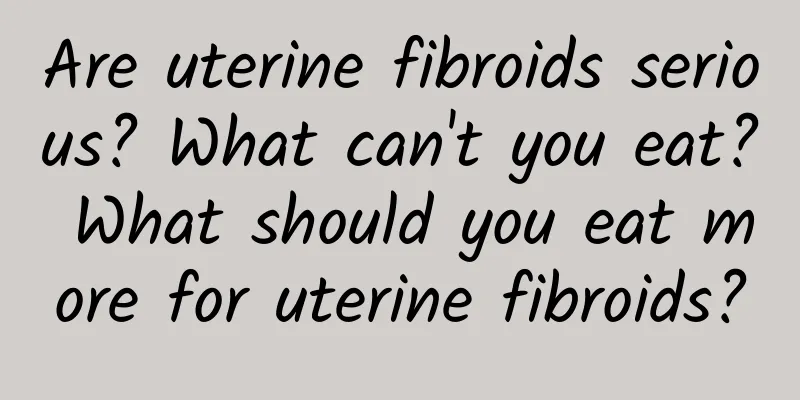How long does it take from admission to discharge for ovarian cyst surgery?

|
How long does it take from admission to discharge for ovarian cyst surgery? Generally speaking, you can be discharged from the hospital within 3-5 days. Ovarian cyst surgery is divided into open surgery and laparoscopic surgery, both of which require anesthesia and abdominal incision, so hospitalization care is required. If you recover well and there is no infection, you can usually be discharged from the hospital within 3-5 days. If there is an accident, please follow the doctor's advice. Causes 1. Genetic factors According to statistics, 20% to 25% of ovarian tumor patients have a family history. 2. Endocrine factors The ovary is an important organ for ovulation and secretion of gonadal hormones. Ovarian tumors mainly occur during the reproductive age. Clinically, the basic pathological and physiological changes of many patients with ovarian cysts and polycystic ovary syndrome are that the ovaries produce too much androgen. Excessive androgen is due to the abnormal synergistic effects of various endocrine system functions in the body. 3. Lifestyle factors Long-term poor diet structure, living habits, and excessive psychological stress may lead to physiological ovarian cysts and true ovarian tumors. 4. Environmental factors Food contamination, such as vegetable and other plant growth hormones, such as lean meat hormone ingredients in livestock and poultry and other formula feed. In recent years, with the improvement of living standards and changes in eating habits, as well as the abuse of hormone drugs and supplements such as breast enhancement, weight loss, and anti-aging by some young and middle-aged women, may also be related to the high incidence and younger trend of ovarian tumors. Clinical manifestations The biggest feature of a medium or lower abdominal mass, if there is no complication or malignant change, is mobility, which can usually be transferred from the pelvic cavity to the abdominal cavity. Malignancy or inflammation, limited swelling and tenderness, and even symptoms of peritoneal irritation and ascites. The diet should not be too greasy and high-cholesterol diet should be avoided, but high-protein intake is conducive to wound healing and recovery; second, an appropriate amount of fruits and vegetables, which are comprehensive in nutrition and rich in vitamins; third, do not eat foods that easily produce gas, which will cause abdominal distension and hinder recovery. Regular ultrasound examinations should be performed after surgery. |
<<: Reasons for delayed menstruation in women
>>: Be careful of the four hazards of cervicitis. How to prevent the recurrence of cervicitis
Recommend
Pesticide-toxic fruit and vegetable controversy: The pass rate is nearly 95%
On the 24th, Greenpeace announced the results of ...
The secret to losing fat in 2 months: weight training + squats
Those who have been to Japan have probably seen t...
Common causes of adnexitis in women
What are the common causes of female adnexitis? I...
Dark chocolate not only protects your heart, but also reduces the risk of stroke! Nutritionist Zhao Hanying: 4 must-know benefits of chocolate
Chocolate is popular among girls because of its s...
Causes of bacterial vaginosis
It is necessary for us to understand the causes o...
Initial treatment of hyperprolactinemia
Nowadays, more and more people are suffering from...
Women should try to understand the prevention methods of vulvar leukoplakia
Vulvar leukoplakia is a common gynecological dise...
Causes of cervical hypertrophy
Cervical hypertrophy is a type of chronic cervici...
What to pay attention to after ovarian cyst surgery
Ovarian cyst surgery is a common surgery in gynec...
Mild cervical erosion can be seen from the erosion surface
Mild cervical erosion can be seen from the erosio...
How to diagnose Bartholinitis
Bartholinitis is a disease that troubles many fem...
Will uterine fibroids cause abdominal obesity? What are the symptoms of uterine fibroids?
It is reported that Ms. Huang, 53, began to notic...
Can you still get pregnant during menopause?
Menopause refers to the stage when women's me...
Does ovarian cyst cause back pain?
Ovarian cyst is a common gynecological disease. O...
There are 6 points to pay attention to in the life of amenorrhea patients
Whether it is primary amenorrhea or secondary ame...









